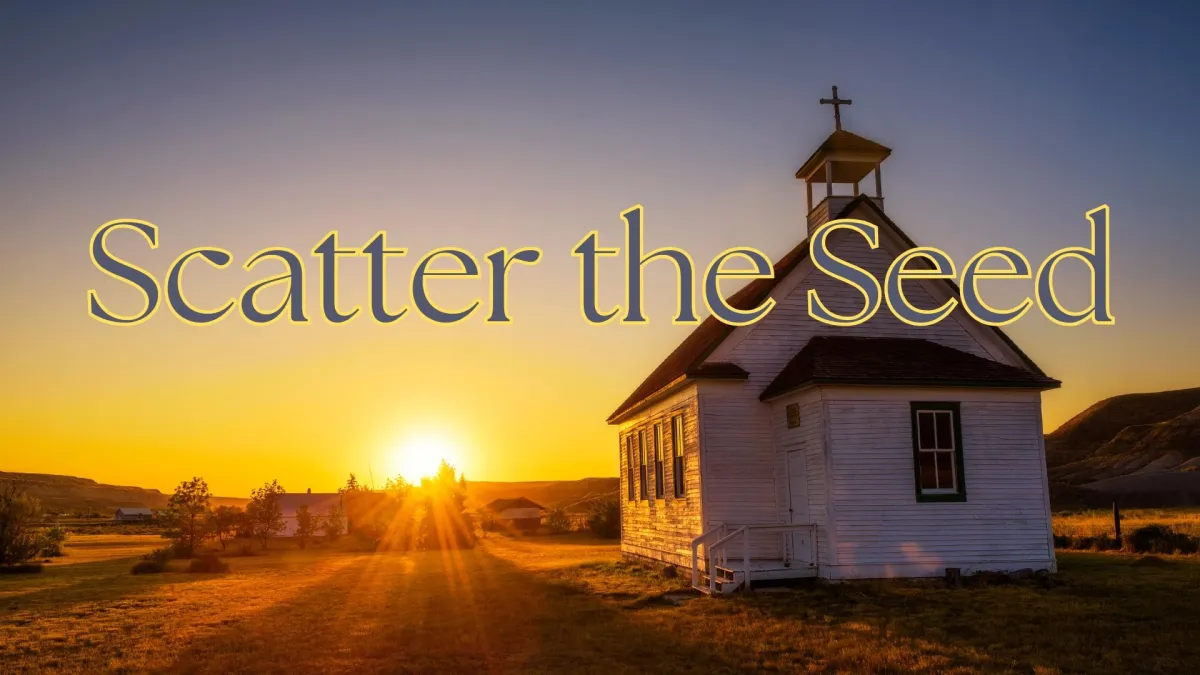
Recognize the Mess
In the Christian life, each of us has been called to make disciples. Jesus related this task to sharing the Word of God in his famous Parable of the Sower. A few disappointments often discourage people and lead them to conclude they don’t have a spiritual “green thumb,” and so they don’t share about Jesus with others.
We see that God’s Word is still the seed we must scatter and that all of us are called to scatter it.
Matthew 13:1–9
Parable of the Farmer Scattering Seed
13 Later that same day Jesus left the house and sat beside the lake. 2 A large crowd soon gathered around him, so he got into a boat. Then he sat there and taught as the people stood on the shore. 3 He told many stories in the form of parables, such as this one:
“Listen! A farmer went out to plant some seeds. 4 As he scattered them across his field, some seeds fell on a footpath, and the birds came and ate them. 5 Other seeds fell on shallow soil with underlying rock. The seeds sprouted quickly because the soil was shallow. 6 But the plants soon wilted under the hot sun, and since they didn’t have deep roots, they died. 7 Other seeds fell among thorns that grew up and choked out the tender plants. 8 Still other seeds fell on fertile soil, and they produced a crop that was thirty, sixty, and even a hundred times as much as had been planted! 9 Anyone with ears to hear should listen and understand.”
In the example, a new generation of farmers encountered seemingly new difficulties with scattering the seed. Some try to embrace something other than good seed for crops. Others begin activities somewhat related to scattering seed, hoping to make the soil happy. All of them stop scattering seed.
How do the farmers’ responses correspond with Christians’ approaches toward sharing their faith?
MAKING DISCIPLES IS EVERY CHRISTIAN’S JOB.
Matthew 13:3
3 He told many stories in the form of parables, such as this one:
“Listen! A farmer went out to plant some seeds.
Jesus told the famous Parable of the Sower in which a farmer scatters seed. In the parable, the health of the plants – if they even grew – depended upon where the seed was scattered.
This act of scattering seed corresponds to sharing God’s message of hope through Jesus Christ as found in the Bible.
Although modern farming often involves neat rows and precision seed placement, ancient farming practices included literally throwing seed out onto the ground.
How does the seed scattering practice of the first century relate to the call to make disciples?
What specific opportunities can Christians encounter daily to share the hope of God’s Word with others?
A farmer who scatters no seed will have no crops.
Many Christians are uncomfortable sharing their faith in this way.
What factors or concerns make you hesitant to share your faith with others?
The Great Commission
Matthew 28:18–20
18 Jesus came and told his disciples, “I have been given all authority in heaven and on earth. 19 Therefore, go and make disciples of all the nations,[a] baptizing them in the name of the Father and the Son and the Holy Spirit. 20 Teach these new disciples to obey all the commands I have given you. And be sure of this: I am with you always, even to the end of the age.”
Several hundred years ago, many Christians believed the words of what we now know as the Great Commission were simply instructions to the Apostles.
Since then, Christianity has increasingly developed an understanding that Jesus’ words applied to subsequent believers, including us.
What should we take away from Jesus’ declaration that all authority has been given to Him?
The key command in verse 19 is to make disciples. How do we do this?
Attached to the command are descriptors. We should be going, baptizing, and teaching as we make disciples. Which of these descriptors comes most easily to you? Which is most difficult?
Jesus promises His enduring presence to those who carry out the Great Commission.
How do you find comfort from this passage?
Some farmers stopped scattering seed after they became enamored with weeds.
For the Christian, what do you think the farmers’ obsession with weeds represents?
Matthew 13:4–8
4 As he scattered them across his field, some seeds fell on a footpath, and the birds came and ate them. 5 Other seeds fell on shallow soil with underlying rock. The seeds sprouted quickly because the soil was shallow. 6 But the plants soon wilted under the hot sun, and since they didn’t have deep roots, they died. 7 Other seeds fell among thorns that grew up and choked out the tender plants. 8 Still other seeds fell on fertile soil, and they produced a crop that was thirty, sixty, and even a hundred times as much as had been planted!
The farmer’s efforts were not met with one hundred percent success.
Most of Jesus’ parable describes the seeds that did not yield a harvest.
How does the farmer’s success rate in the parable encourage you?
RESPONSES TO THE GOSPEL REFLECT THE CONDITION OF PEOPLE’S HEARTS.
Mathew 13:18–22
18 “Now listen to the explanation of the parable about the farmer planting seeds: 19 The seed that fell on the footpath represents those who hear the message about the Kingdom and don’t understand it. Then the evil one comes and snatches away the seed that was planted in their hearts. 20 The seed on the rocky soil represents those who hear the message and immediately receive it with joy. 21 But since they don’t have deep roots, they don’t last long. They fall away as soon as they have problems or are persecuted for believing God’s word. 22 The seed that fell among the thorns represents those who hear God’s word, but all too quickly the message is crowded out by the worries of this life and the lure of wealth, so no fruit is produced.
Jesus’ disciples were unsure of the meaning of Jesus’ parable, so they asked Him what it meant.
In this passage, Jesus explained three responses to hearing God’s Word.
Some do not understand. Verse 19 says that the Word was sown in the person’s heart, but the soil there is too hard-packed for it to take root. So, the evil one easily snatches away what was shared. Many people’s life experiences harden them to God’s Word. Though the gospel is shared, it is foreign to their worldview. What experiences can contribute to a person’s inability to absorb the truth of the gospel?
Some hear the Word and respond quickly and profoundly. What seems initially encouraging, however, soon ends tragically. Their rapid but nutrient-depleted growth came without being rooted in good soil. At the first whiff of trouble, they fall away. What life factors put a person on the rocky soil that Jesus describes?
Others are in soil that is not bad but is weedy. The cares of the world choke out godly growth, making these people spiritually anemic. In this case, Jesus does not say the plant dies; instead, He says it is unfruitful. What are the symptoms of a person who is familiar with God’s Word but is nevertheless unfruitful?
Jesus Himself mentioned three disappointing responses to sharing God’s truth.
How does this expectation bring you comfort?
Our own receptivity to the truth of God’s Word changes over time.
Describe a time when you were less receptive to God’s Word.
How fertile is the soil of your heart right now? If there are barriers to your spiritual receptivity, what would remove them?
MAKING DISCIPLES INCLUDES TENDING PEOPLE’S HEARTS
Matthew 13:23
23 The seed that fell on good soil represents those who truly hear and understand God’s word and produce a harvest of thirty, sixty, or even a hundred times as much as had been planted!”
In Jesus’ parable, the farmer scattered seed in a large area, including in spots that were unlikely to produce a crop. The fourth response to the seed is full growth and production. Farmers know that ground must be worked to become ready for seed.
We heard about farmers who began focusing on the health of the soil.
How do Christians help improve the “soil health” around them to help people become receptive to God’s Word?
The soil health farmers began working with ants to help cultivate the soil. Their mistake was not their attention to soil but their lack of attention to scatter seed. How can Christians ensure their influence does not neglect sharing the gospel?
Why is prayer essential to our mission?
All Things to All People
The Apostle Paul viewed people through a lens of opportunity to reach them with the gospel.
1 Corinthians 9:19–23
19 Even though I am a free man with no master, I have become a slave to all people to bring many to Christ. 20 When I was with the Jews, I lived like a Jew to bring the Jews to Christ. When I was with those who follow the Jewish law, I too lived under that law. Even though I am not subject to the law, I did this so I could bring to Christ those who are under the law. 21 When I am with the Gentiles who do not follow the Jewish law,[a] I too live apart from that law so I can bring them to Christ. But I do not ignore the law of God; I obey the law of Christ.
22 When I am with those who are weak, I share their weakness, for I want to bring the weak to Christ. Yes, I try to find common ground with everyone, doing everything I can to save some. 23 I do everything to spread the Good News and share in its blessings.
Answer these questions:
If Paul understood freedom from the law, why did he consider himself a slave to everyone?
How did Paul adjust his approach to others to create gospel impact?
What is Paul’s motivation, according to verse 23?
How does Paul’s example inspire your own response?
We heard a short story of a train gate operator who failed to light his lantern when a train approached. He said, “Christians are called both to wave their lanterns and keep them illuminated by the light of Christ! We recognize a mess in our world exists because those who wave their lanterns do so without that Light, and those with the Light neglect to display it to the world around them.” Christians often struggle with one of these issues? Do you find it more difficult to infuse the gospel message with those you serve, or to step out and serve in the first place?
It can be easy to allow division to cloud our efforts. Many people display activism and passion for various issues, and these can distract from our seed-scattering efforts. What issues in our culture can steal away Christians’ attention from sharing the gospel?
How can we help one another to stay focused on our calling?
Last Word
As with scattering seed, when sharing the hope of Christ, we are not responsible for the results.
God is the One who brings growth through our efforts.
This knowledge frees us to faithfully fulfill our calling to make disciples – to scatter the seed – and watch God bring transformation and bear fruit.
Because growth is spiritual, we must rely on God.
Prayer is a valuable tool to help us rely on God’s power while remaining focused on God’s mission.
This week, consider praying for people whose hearts may not yet be receptive to the Lord.
Remember to ask God to improve the soil of your own heart, too.
